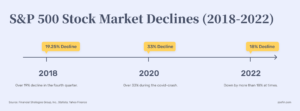Market Volatility for Retirees




Written by:
Brice Carter CFP®, CIMA®, ChFC®, CAP®, MSFS
Zoe Advisor Network
Market Volatility for Retirees
Reading Time: 5 minutes




Written by:
Brice Carter CFP®, CIMA®, ChFC®, CAP®, MSFS
Zoe Advisor Network
Market volatility can throw a (big) wrench in your future plans, especially if you are already retired or looking to retire anytime soon. Of course, volatility is nothing new for many retirees. Here are some insights to navigate market volatility.
Sit back and imagine watching the movie of your life; all of your decisions, investments, and experiences lived to this day. Plenty of hard work has gone into building the life you now enjoy and the future you envision. But, market volatility can throw a (big) wrench in your future plans, especially if you are already retired or looking to retire anytime soon. Of course, volatility is nothing new for many retirees. You’ve navigated more than one bear market, where stocks decline by 20% or more from a recent peak in current years. In fact, those who retired post-2017 are staring at nearly the third bear market in only four years (as shown in the figure below).



For investors, bear markets are concerning because it means many companies see their stock prices decline precipitously, resulting in seemingly vanished funds. If you have your savings in stocks and rely upon those for your retirement, you may have lost a fifth of the value of your investments.
Inflation & Recession Cause Retirement Challenges for Retirees
Notable market drops can be alarming for retirees as they indicate what some have forgotten during the longest bull market in history: investments come with significant risk. Even though there are various factors to consider, an added challenge for retirees is that this year, a notably “safe” investment, bonds, have also seen a steep decline. As measured by the Bloomberg Aggregate Bond Index, the bond market has been down over 10% in 2022. Currently, the bonds that generally serve as anchors during rough stock market seas have sold off. Where does this leave us?
A Closer Look Into Bond Decreases for Retirees
As a retiree, you are not alone in wondering how concerned you should be about the bond market. But the worst thing one can do amid market volatility as a retiree or soon-to-be retiree, is to stick your head in the sand about market downturns. Traditionally, bonds have been a good hedge against stock downturns. However, the importance of the recent decline in bonds comes from their inverse relationship with interest rates. In other words, when interest rates rise (or it is believed that they will increase), bonds go down in value and are sold at a discount. Consequently, in a situation where the market conditions are as previously explained, selling your bonds or stocks in a panic would be more harmful than helpful.
You’ll likely relate to this story: Suppose you bought a bond from a highly rated company two years ago (when interest rates were really low). That bond may have been issued at 2%. If that same highly rated company wished to issue more bonds today (during a higher interest rate environment), they would likely have to issue these new bonds at a much higher rate, for example, 4%. Since the new bonds are at a much higher interest rate than your old bonds, if you wished to sell your old bonds, you would need to sell them at a discount. For retirees, this could mean cutting some aspects of your retirement lifestyle.
Tactics for Riding Out Volatility for Retirees
Like every good movie, there is a resolution. This one includes a thought-out investment strategy to protect your financial future. The lack of standard volatility is, without a doubt a challenging investing environment for retirees in 2022. As a result, when working with retired clients, investment advisors such as myself often recommend a variety of tangible and intangible tactics for riding out stock market volatility.
1. Maintain a Source of Income
During periods of extended volatility, it can be extremely beneficial to have a basket of assets that is liquid and stable to draw income from. For example, money market funds and short-term government bond funds can provide an income filler to give traditional bond and stock market investments time to recover. This can prevent unnecessary selling of assets while they are down.
2. Keep the Long Term in Mind
Believe it or not, a 65-year-old still has a very long-term investment horizon. With life expectancies continuing to rise, it’s very likely a 65-year-old has a 30-year investment horizon. With a bear market expected roughly every five years, that is a lot of volatility ahead. Stay the course and keep the long term in mind to help ease panic and prevent poor decisions.
3. Focus on Diversification
Diversification is crucial while you’re in the accumulation phase, but it is essential during the distribution phase—for example, the difference between large growth stocks and large value stocks in 2022. As of 6/15, large growth was down over 27% YTD while large value is down around 11%. As a retiree, if you’re over-allocated to one asset class or another, you are exposed to further volatility. Although it is true that diversification will not make a retiree immune from market volatility, it can certainly smooth out the bumps.
4. Have an Investment Policy Statement
An institution’s investment policy statement is a strict set of rules. These are policies and procedures for their investment process and approach. In contrast, for an individual investor or retiree, an investment policy statement serves as an affirmation of investment discipline. The statement establishes why you are investing and that you will focus on the long term and stick with established investment strategies. This signed document can come in handy when the winds of volatility start to sow doubt about the process. By signing this affirmation, retirees are committing to a process that will help keep their financial plan on track.
Navigating Market Volatility in Summary
As a retiree who has lived through wars, financial crises, inflation, and other market headwinds, you can find comfort in looking back at those events and knowing that this too shall pass. By having a thought-out retirement plan with an investment policy statement, retirees will more easily be able to ride out these rough patches and focus on enjoying their retirement. After all, retirement should be 30 years on Saturdays.
Ready to Grow
Your Wealth?
Let us connect you with the most qualified wealth planners
Ready to Grow Your Wealth?
Let us connect you with the most qualified wealth planners